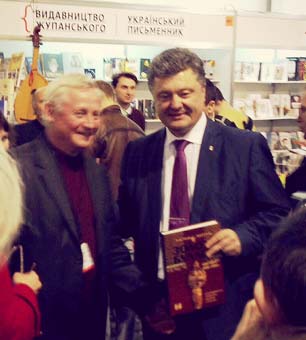On Sunday May 25, the “Chocolate King” handily won the Ukrainian presidential elections in the first round. Billionaire Petro O. Poroshenko is so named because he made his fortune in the confectionary business. The defeated runner-up, former prime minister Yulia V. Tymoshenko is sometimes referred to as “the Gas Princess,” since she struck it rich in the energy sector. It seems that Ukraine has not yet achieved the nominal separation of oligarchy and state that we have in the United States, and being extremely rich is almost a constitutional requirement to run for president – like being at least 35 years old and a natural-born citizen is here.
The U.S. government, which has invested billions of dollars over the past 20 years to bring Ukraine into its political/military alliance in the region, seems pleased with the result. It has become standard operating procedure to get an elected government as soon as possible after a coup such as the one that toppled the prior elected (also super-rich) President Viktor Yanukovych in February with help from Western governments. Yanukovych, who tried to balance his government between the competing interests of the U.S./EU and Russia, never really had a chance. If he had agreed to the IMF conditions, his government would probably have become at least as unpopular as it did when he turned to Russia for a desperately-needed $15 billion dollar loan.
Which brings us to today: the new government of the Chocolate King is committed to those same conditions, now spelled out in an IMF agreement released at the end of April. I would not want to be in his shoes. After two years of almost no economic growth, the IMF is now projecting a steep recession for this year, with the economy shrinking by 5 percent. This is largely because of budget tightening that the government has committed to, amounting to about 3 percent of GDP over the next two years. (For comparison, think of the U.S. government cutting $500 billion, roughly the equivalent of the Pentagon’s annual base allocation, from its budget over two years.) The economy is supposed to recover next year, but we have heard that before – think of Greece, or Spain, or eurozone austerity generally over the past four years.
Poroshenko took a hard line against Russia during his electoral campaign, which was not surprising since millions of Russian-speaking voters in eastern Ukraine would not be voting anyway – some because they didn’t consider the election legitimate and many because armed militants closed the polling places. But he has since become friendlier, emphasizing his good personal relations with Russian President Vladimir Putin. This is probably a smart move, and not only because Russia can help him negotiate an end to the civil conflict. (Recent events indicate that Russia may have less influence on separatists in eastern Ukraine than the U.S. and EU have on their allies in the west.)
As it turns out, Putin does not appear interested in annexing more pieces of a divided Ukraine, contrary to the assertions of some in the U.S. His main goal seems more likely to be preventing Ukraine from becoming another base for the NATO military alliance, on its border, which in Russia is understandably seen as a threat. (NATO added 12 countries from Eastern Europe between 1999-2009.) And this could be better achieved through negotiations. As for Poroshenko, depending on how badly things go with the IMF/EU program, he may end up needing help from Russia after all. At the very least he wouldn’t want to leave himself completely at the mercy of the IMF-Washington-EU decision-makers. They have a plan to restructure Ukraine’s economy, and it could turn out to be a mass-unemployment nightmare.
Join us in defending the truth before it’s too late
The future of independent journalism is uncertain, and the consequences of losing it are too grave to ignore. To ensure Truthout remains safe, strong, and free, we need to raise $50,000 in the next 10 days. Every dollar raised goes directly toward the costs of producing news you can trust.
Please give what you can — because by supporting us with a tax-deductible donation, you’re not just preserving a source of news, you’re helping to safeguard what’s left of our democracy.
